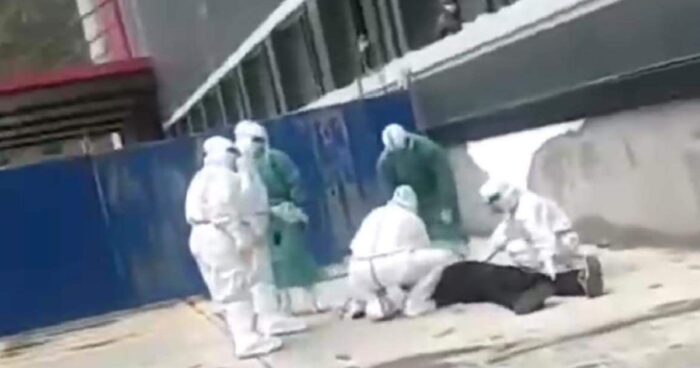With Chinese officials making no significant changes to their inhumane COVID-19 restrictions in Tibet’s capital of Lhasa despite issuing a recent public apology, a spate of suicides has taken place in the city over the past week. In the span of two days, at least five people took their own lives by jumping to their deaths in various parts of Lhasa and its suburbs, according to sources the International Campaign for Tibet reached out to.
“The International Campaign for Tibet is deeply concerned about these developments and urges the Chinese government to refrain from repressive measures and allow space for Tibetans to express their legitimate grievances,” said ICT, an advocacy group that promotes human rights and democratic freedoms for Tibetans.
“China’s mismanagement of COVID in Tibet reveals the extreme human costs when authoritarian police states prioritize censorship and social control over the wellbeing of the people.”
A closer analysis of the five known suicides between Sept. 23-24 suggests that all were due to the extreme hardships endured under China’s zero-COVID policy restrictions. The psychological impact of living a highly controlled life in COVID lockdowns and inside mass state-mandated quarantine sites may have driven all five Tibetans to commit suicide by jumping off buildings.
Since the second wave of COVID hit Lhasa almost two months ago, Lhasa authorities, in their efforts to enforce Beijing’s zero-COVID policy, have severely mishandled their COVID response. Before the authorities stepped up censorship to prevent the spread of news about their COVID mismanagement, Tibetans from all walks of life and age ranges openly shared their grievances and pleas to end the harsh COVID measures. Those measures have exacerbated the community spread of COVID as well as accelerated already rising cost-of-living expenses.
The Lhasa government’s failed response also revealed the institutional indifference built into local government and exacerbated the strained and already broken communication channels between Tibetans and the authorities.
The Lhasa government’s increased censorship, tactical public apology and subsequent police crackdown on Tibetans for “spreading COVID rumors” and their grievances online have led the five Tibetans to commit suicide in a desperate cry for help.
ICT believes Tibetans are in despair and have no hope for their future under Chinese rule. With Tibet having endured decades of Chinese oppression, the extreme restrictions enforced under COVID lockdown, combined with poor quarantine conditions, raise legitimate fears that this is the future of Tibetan society, and that very little will change after COVID. With no hope for basic freedoms or rights to express their pain or insecurity, they feel the only way out of their situation is to take their own lives.
Five suicides
Content warning: The images and videos below show graphic scenes of suicide. Please be advised.
At least five Tibetans in Lhasa and the suburbs are confirmed to have jumped to their deaths from buildings. Sources in Lhasa share that the suicides were committed off of mass quarantine sites or residential buildings under lockdown in:
- Toelung Shongpa Lhachu (Chinese: Duilong Xiangba Laqu). Shongpa Lhachu in Lhasa’s Toelung district now falls under the 5 square kilometer Lhasa Comprehensive Bonded Zone (Baoshui Qu Erhao) established by China’s state council in April 2020.
- Gakyiling zone 3 (Gaji Sanqu)
- Lanting apartment building
- Tibet Tibetan medicine university
- 8-1 (Bayi) Community, Liberation (Jinzhu) West Road Street
The suicide at the sports ground turned state-mandated mass quarantine site located in Toelung Shongpa Lhachu, 15 kilometers west of the Potala Palace, has been documented in videos and images by Tibetans at the quarantine building. The man died after jumping from the third floor of the building. In a video clip taken at the ground level, a small gathering of onlookers observes from a distance men in hazmat suits handling the dead body on the ground. Another video clip shows the commotion inside the third floor straight after the man jumped out the window. A third aerial video clip, taken from the building’s upper floor, shows a team of medical staff and men in white hazmat suits examining the dead body on the ground.

In another video clip taken at Tibet Tibetan Medicine University (formerly Tibet Medical College), which doubles as a mass quarantine site, around 50 people can be seen surrounding a covered body on a wet ground. The man had committed suicide by jumping from the quarantine building window.
A blurry image depicts the scene after an individual jumped out the window during the night at Gakyiling zone 3. Emergency vehicle and some men in hazmat suits have gathered at the scene. The man is reported to have died after the jump.

Although COVID suicides were also reported at other sites, images or videos could not be obtained from Lanting apartment building and 8-1 (Bayi) community, Liberation (Jinzhu) West Road Street.
CCP must address COVID suicides in Tibet
The Chinese Communist Party’s rigid zero-COVID policy has caused serious harm to both Tibetan and Chinese communities. The CCP leadership’s hardline zero-COVID policy and attempts to project its authoritarian system as superior to democratic systems in great power politics have caused extreme and unnecessary hardship for Tibetans in Tibet and for Chinese society.
Despite Lhasa’s Vice-Mayor issuing a tactical public apology to Tibetans in Lhasa on Sept. 17, no meaningful remedial measures have been implemented to ameliorate the harsh lockdown and quarantine conditions imposed by the official zero-COVID policy. The COVID suicides in Tibet are a manifestation of the CCP’s zero-COVID policy failure and the authorities’ rejection of Tibetan grievances and pleas to end the extreme response.
Tibetans living under Chinese rule have already suffered for decades as second-class citizens due to Beijing’s hardline policies targeting Tibetan identity, culture, language and religion. The COVID outbreak in Tibet has resulted in the expansion of already invasive and suffocating living conditions in Tibet. This has therefore fueled anger, frustration and despair among Tibetans.
Tibetans in Tibet are not committing suicide because they are inherently weak or unable to handle the pressures of life. Beijing must recognize that the combination of decades-long repression and the rollout of new, extreme and inhumanely enforced COVID restrictions are causing Tibetan suffering and suicides.

